The FiiO BTR5 is and has been FiiO’s flagship Bluetooth digital-to-audio converter (DAC) since it was released. First unveiled and released in early 2020 to great praise and reviews, this affordable pocket-sized device has pulled in tons of fans and users with its design and functions. A year after this release, though, FiiO found that they could still improve on its design and acted on it.
The 2021 revision of the original BTR5 DAC has two major changes. The first comes in the form of two DAC/Amp ES9219Cs chips, instead of the older ES9218P chips. Its second and most important upgrade is the compatibility with high-quality MQA (Master Quality Authenticated) codec files. With that said, is the FiiO BTR5 (2021) really that good? To find out, here’s our FiiO BTR5 review!
Also read: The Best Planar Magnetic Headphones
Inside This Article
FiiO BTR5 Specifications
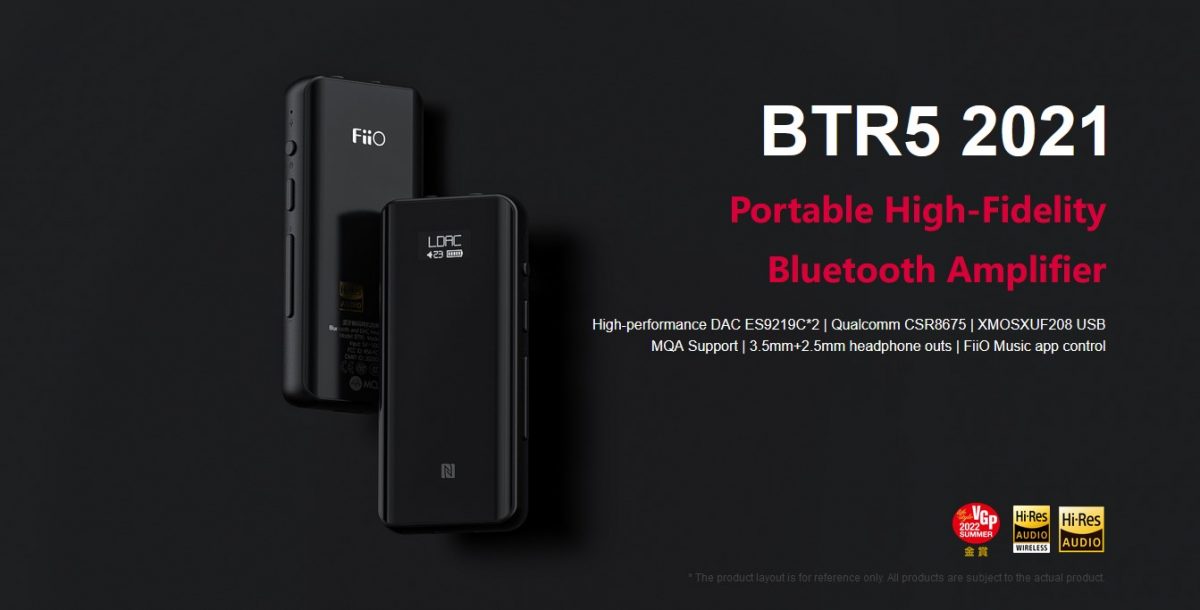
As part of FiiO’s BTR line (no, not the Russian BTR armored transporters), the FiiO BTR5 is FiiO’s premium Bluetooth flagship offer when compared with the BTR3 and the BTR1. The improved 2021 version keeps a lot of the original model’s style and form. Due to this, the BTR5 2021 is basically the same as the original model in looks and weight but has different core chips inside. Here is a quick side-by-side rundown on the specs of both the BTR5 and the improved BTR5 2021.
BTR5 vs BTR5 2021 Tech Sheet
| Specs | BTR5 2021 | BTR5 |
| Dimensions | 72*32*11.1mm (excl. back clip) | 72*32*11.1mm (excl. back clip) |
| Weight | 43.7g | 43.7g |
| Volume Adjustment | 60 Steps / Independent adjustment | 60 Steps / Independent adjustment |
| Bluetooth Profile | SBC, AAC, aptX, aptX LL, aptX HD, and LDAC | SBC, AAC, aptX, aptX LL, aptX HD, and LDAC |
| Supported Audio Formats | A2DP, AVRCP, HFP, HSP, and MQA | A2DP, AVRCP, HFP, HSP |
| Bluetooth Version | 5 | 5 |
| Bluetooth Chip | CSR8675 | CSR8675 |
| DAC and Amp Chip | (2) ES9219C | (2) ES9218P |
| USB DAC Chip | Xmos Xuf208 | Xmos Xuf208 |
| USB DAC Format | 384k/32bit DSD 256 |
384k/32bit DSD 256 |
| Dedicated Pairing and Volume Buttons | Yes | Yes |
| Transmission Distance (at open area) | About 10m | About 10m |
| Status Indicator & Display | 0.49′ 64×32 OLED Battery, Format, Volume Menu setting |
0.49′ 64×32 OLED Battery, Format, Volume Menu setting |
| Line Control | CTIA Microphone/Vol/Track | CTIA Microphone/Vol/Track |
| 3.5mm Headphone Output | 80mW | 80mW |
| 2.5mm Balanced Output | 240mW | 240mW |
| Signal-to-noise Ratio (A Weight) | 122dB | 122dB |
| USB Port | Type C | Type C |
| Battery Capacity | 550mAh (9 hours in AAC mode) | 550mAh (9 hours in AAC mode) |
| Charging Time | 1.5 hours | 1.5 hours |
| App Controller | Yes | Yes |
As we said earlier, the main differences between the old and improved 2021 BTR5 versions are the DAC/AMP chips and MQA file compatibility. Other minor differences include a quick one-press “USB Audio Adapter Mode” when using the USB cord to connect with other devices and a reduction of the internal filters to 2 from 6 (due to the integration of MQA support). Even with these minor differences, though, both the BTR5 and its 2021 version still offer a workhorse Bluetooth DAC that can handle almost anything you can throw at it.
Get the FiiO BTR5 2021 Edition from Amazon
FiiO BTR5 Review: What’s in the Box?
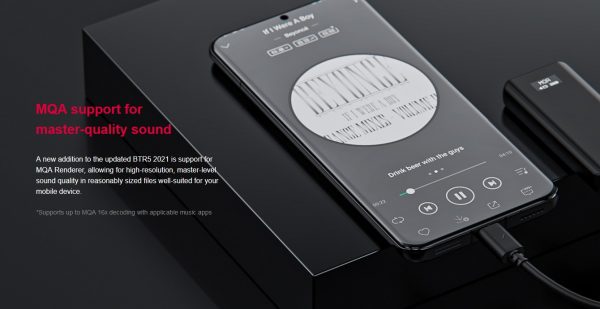
Before we fully start with our FiiO BTR5 review, let us take a look at what you can get with the box. Unboxing the BTR5 is pretty straightforward since it is just a pull-up box covered with protective plastic. That said, the box does not feel cheap and slides out easily. It feels similar to some of Apple’s boxes. Inside the box and with every purchase of the BTR5 2021, you get a sleek and shiny FiiO BTR5 Bluetooth DAC/Amp. Sadly, they only offer the BTR5 2021 in black, but that may change in the future. Aside from that, you also get a transparent back case for it (with belt clip), a USB Type-C charging cable, a user manual, a quick start guide, and a warranty card. Besides a smartphone and a pair of wired headphones/earphones, this is all you need to use the Bluetooth BTR5.
FiiO BTR5 Pros and Cons
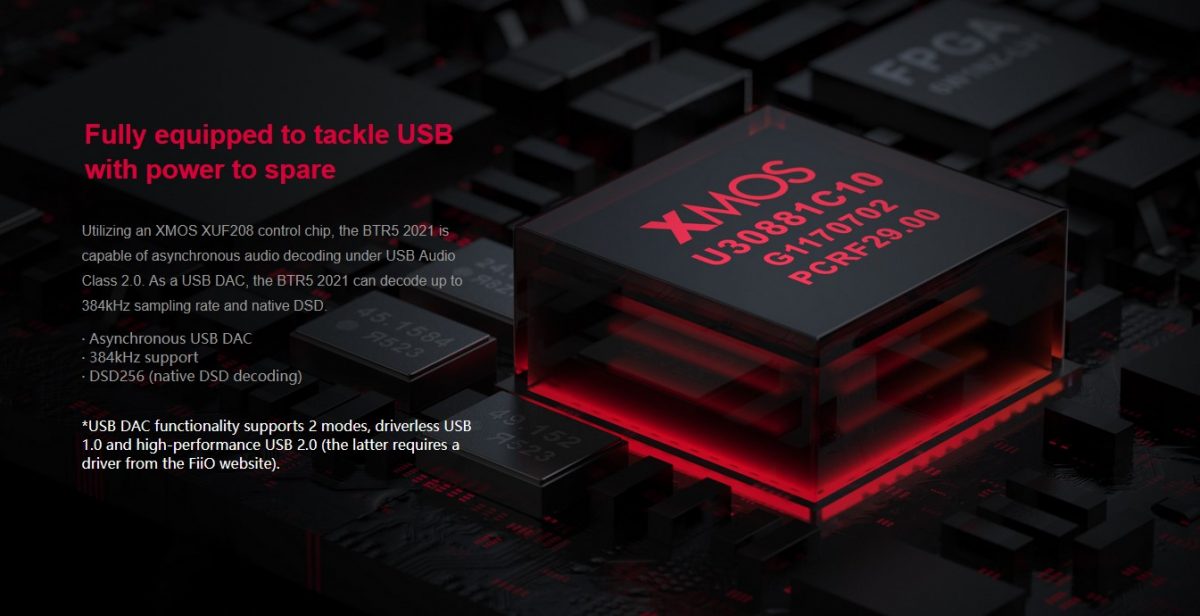
Pros
- Decently Priced
- Plug-and-play
- Hardy (aluminum alloy body covered by 2.5D glass)
- Small and portable (72 x 32 x 11 mm at just 43.7 grams)
- Dual (Bluetooth 5.0 and wired USB) DAC set-up
- Compatible with the FiiO Control and FiiO Music apps
- Supports A2DP, AVRCP, HFP, HSP, and MQA formats
- Uses SBC, AAC, aptX, aptX LL, aptX HD, and LDAC audio profiles
- 2.5mm (balanced) and 3.5mm output
- Compatible with any Bluetooth and USB-C audio device
Cons
- Decent battery capacity (550mAh up to 9 hours on AAC mode)
- Cramped OLED screen
- Needs a third-party app to play lossless audio
Designed to replace your phone’s basic 3.5mm audio jack or its USB Type-C port for audio, there is a lot to like about the FiiO BTR5 2021. Aside from the BTR5 2021’s wireless Bluetooth 5.0 connectivity, its MQA codec capability and its general hardy pocket-sized design are all big pluses. In comparison, we can only complain about its somewhat underwhelming 550mAh battery capacity and small OLED screen.
Design: Sleek Like a Smartphone
Externally, there is no visible difference between the BTR5 and the BTR5 2021. Both models have a sleek smartphone-like design with easy-to-access control buttons on the side. It has curved edges, and sides with its back and front covered by a 2.5D oleophobic (oil-resistant) coated glass shell. This shell overlaps a strong aluminum alloy frame that is responsive and smooth to touch. Overall, the BTR5 2021 has a modern aesthetic similar to modern smartphones like the iPhone 12 or the long-awaited Samsung Galaxy S22 that balances form and function.
Sound and Audio: Clearly Superior
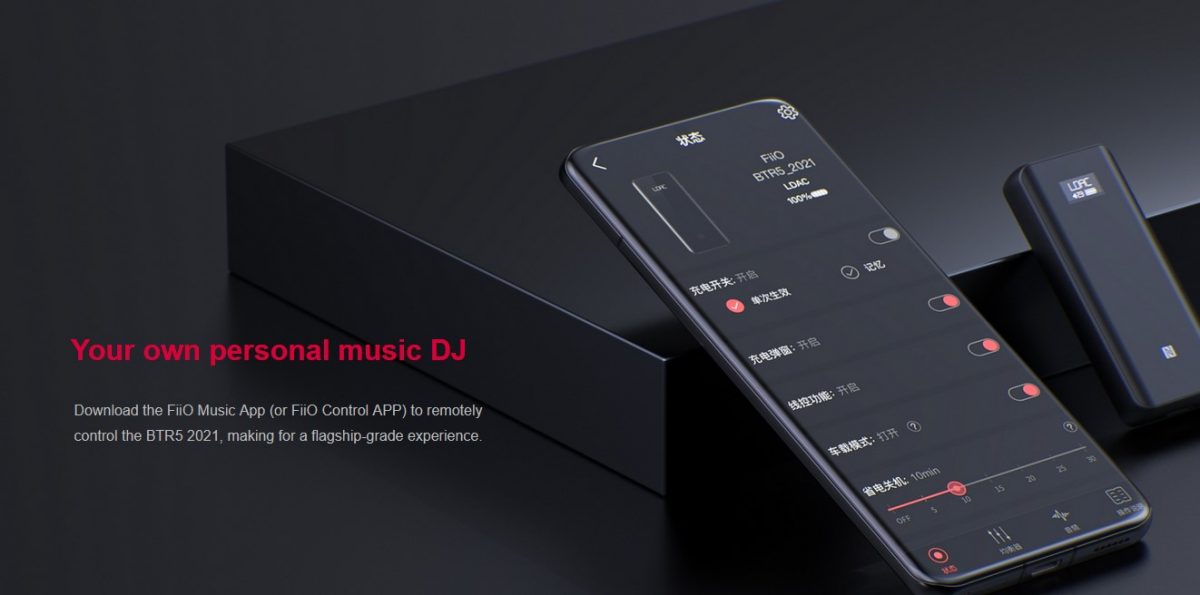
Now for the more important thing when looking at one of the best DACs and audio products — the sound. The BTR5 2021 is quite clearly superior to its older model due to the newer dual DAC/Amp ESS Technology ES9219C installed in it. Specification-wise, both versions of the BTR5 look equal due to their similar signal-to-noise ratios and their headphone power output. That said, the 2021 version has a better set of Bluetooth DAC chips that send out better clarity and less distorted audio.
Speaking of headphone output, the BTR5 has two — a 2.5mm balanced output and a 3.5mm single-ended stereo. Depending on what you want to use, both have decent headphone impedance that ranges from 16-100 Ohms (3.5mm) and 16-150 Ohms (2.5mm). For those wanting to use stronger over-ear headphones that need a fair bit of power, the 2.5mm balanced output can reach around 240mW and will work to power classic headsets like the Sennheiser HD 600 (so long as they are compatible of course.)
Finally, if you are not satisfied with the pre-tuned equalization on the BTR5 2021, it also has an equipped audio equalization (EQ) you can use to adjust your listening experience. You can only access these settings if you install the FiiO Control app for Android and iOS.
Connectivity and File Formats: Adaptable
While mainly marketed and sold as a Bluetooth DAC, the FiiO BTR5 2021 also works as a USB wired DAC through the Xmos Xuf208 chip. This means that owners can use it as both a wired and Bluetooth DAC when needed.
When using it as a Bluetooth DAC, however, it can only work while using the following audio profiles: SBC, AAC, aptX, aptX LL, aptX HD, and LDAC. In addition, the BTR5 can only play A2DP, AVRCP, HFP, and HSP audio formats alongside the newer MQA.
Hardware-wise, the FiiO BTR5 is Bluetooth 5.0 equipped due to its CSR8675 Bluetooth chip and uses a USB Type-C port for communication and charging. It also has an NFC touchpad for quick linking and pairing with compatible devices.
Controls: Simple and Intuitive
Looking at it, the FiiO BTR5 has just four simple and intuitive buttons that operate it. These four buttons are on the right side of the device and are arranged similarly to smartphones. The first button is a simple on/off button that doubles as a reset, recall, exit, or switch menu button. The other button is also multi-use, with the second button being the connect back/play/pause/ connect incoming calls and cancel button. Finally, the last two buttons are the volume bar with the usual volume up/down or previous and next song selection functions.
As we said earlier, additional controls like EQ and “car mode” can also be used if you install the FiiO Control app for Android or iOS. Other options and controls on the app include charging settings, automatic idle power-off timers, forced Bluetooth codec selection, an in-depth audio settings chart, low-pass filter options, and an operating guide for your device.
Battery and Charging: Can Be Improved
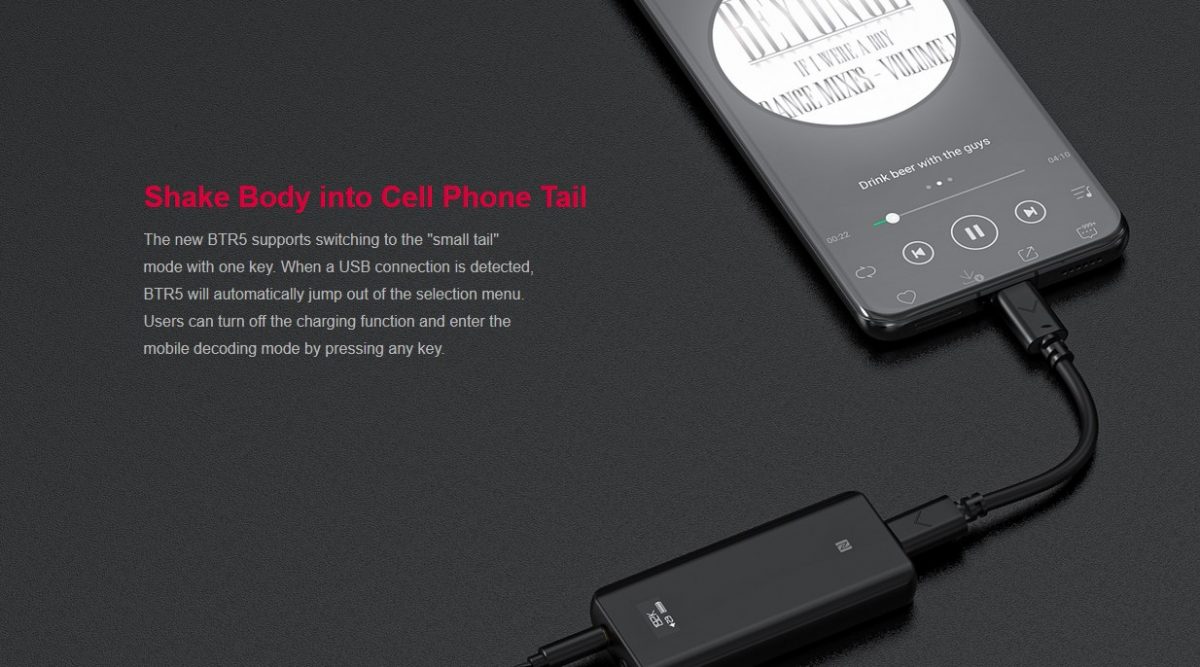
And finally, battery and charging are the last important thing to look at with Bluetooth DACs. For the FiiO BTR5 2021, charging is pretty straightforward. As we said earlier, all you need to do is charge it using its USB Type-C cable.
A full charge when using the BTR5 on AAC mode will usually last around 9 hours due to its decently sized 550mAh battery. Meanwhile, the charging time from 0% battery to 100% battery is around 1.5 hours, give or take a few minutes. This charge time is only when using a standard DC 5V 500mAh charger since it is unable to take advantage of stronger chargers.
Who Should Buy The FiiO BTR5?
Since the original BTR5 was first released in 2021 and even with the new BTR5 2021, both have served to fill in one gap. They are both made to be cheap but high-quality and high-fidelity portable Bluetooth DACs. So, if you are constantly on the go but want to have wireless HiFi, the FiiO BTR5 2021 is the perfect companion for you!
Our Verdict
With everything we have talked about up to this point, how do we look at the FiiO BTR5 2021? While there is a lot of competition when it comes to Bluetooth DACs like the Chord Electronics Hugo 2 or the iFi Go Blu, the BTR5 2021 has a lot going for it. We are not just talking about looks here, it has an affordable price, consistent build quality, and a decent battery capacity. Moreover, the FiiO Control and FiiO Music app for Android or iOS is a good bonus to it. We also do not even need to talk about comparing the BTR5 2021 to the older and weaker FiiO BTR3K to know which is better. Overall, the BTR5 2021 is a great Bluetooth DAC that is perfect for those who want wireless HiFi but can’t pony up their wallets for top-shelf models.
